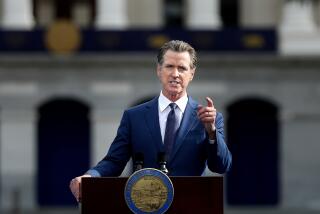Deplored Administration’s Pressure, Greenspan Says
- Share via
WASHINGTON — Federal Reserve Chairman Alan Greenspan said today that he had “objected quite strongly” to an instance of political pressure from the Reagan Administration and warned that further pressure on the central bank could be counterproductive.
Greenspan said his protest was sparked by a letter written in January by Michael Darby, assistant Treasury secretary for economic affairs.
Greenspan was questioned about the letter by Sen. William Proxmire (D-Wis.), who said the letter was one of a series of recent attempts by the Reagan Administration to pressure the Fed to lower interest rates as a way of spurring economic growth during a presidential election year.
“I think it is both deplorable and counterproductive for the Reagan Administration to pressure you as much as they have in recent months,” Proxmire, the chairman of the Senate Banking Committee, told Greenspan.
Greenspan said that he had a disagreement with both Darby and Beryl Sprinkel, the President’s chief economic adviser, over the matter of money growth.
He said that while disagreements over policy are acceptable he is concerned about the manner in which the Administration’s criticism could be perceived by financial markets.
Expects No Recurrence
“When I heard about Dr. Darby’s letter I objected quite strongly. As best as I could determine, he was not aware of the implications,” Greenspan said. “I am reasonably sure such an action will not occur in the future.”
Greenspan said his concern was that the letter was sent in the weeks before a key meeting where top Fed officials were going to set monetary targets for the next year.
Greenspan did not say with whom he raised his objections, although it has been reported that Treasury Secretary James A. Baker III was instrumental in toning down criticism of the Fed in the economic report of the President before it was released last week.
In the President’s report, Sprinkel suggested that tight-fisted Fed policies were partly to blame for the collapse of the stock market on Oct. 19.
Greenspan said he fully expected to have policy disputes with this Administration and the next Administration, but he added, “The only thing I hope that does not happen is that the concern over political pressure gets so extraordinary that we end up taking actions” in the opposite direction just to prove that the Fed is independent.
More to Read
Get the L.A. Times Politics newsletter
Deeply reported insights into legislation, politics and policy from Sacramento, Washington and beyond. In your inbox twice per week.
You may occasionally receive promotional content from the Los Angeles Times.










